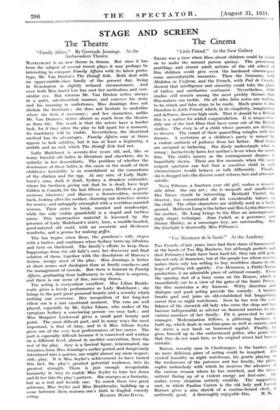STAGE AND SCREEN
"Family Affairs." By Gertrude Jennings. At the Ambassadors Theatre
MATRIARCHY is no new theme in drama. But since it has been the subject of several recent plays it may perhaps be interesting to compare Family Affairs with its latest proto- type, Mr. Van Druten's The Distaff Side. Both deal with an upper-middle-class family of the present day, living in Kensington in slightly reduced circumstances. And over both Miss Auriol Lee has cast her meticulous and veri- similar eye. But whereas Mr. Van Druten writes always in a quiet, sub-theatrical manner, and conveys his story and his meaning in undertones, Miss Jennings does not disdain the histrionic ; she does not hesitate to underline where she feels it necessary ; and her characters, unlike Mr. Van Druten's, derive almost as much from the theatre as from life. The result is that the actors have a harder task, for if they allow the play to fall apart for a moment, its machinery will be visible. Nevertheless, the theatrical method has its advantages. Family Affairs may at times appear to lack subtlety, but it has at least a beginning, a middle and an end, which The Distaff Side had not.
Lady Madehurst is seventy-five years old, and, like so many forceful old ladies in literature and elsewhere, she is unlucky in her descendants. The problem of whether the dominance of these ladies is the cause or the result of their children's instability is as roundabout as the conundrum of the chicken and the egg. At any rate, of Lady Made- hurst's sons, Jack is dead, Sydney a drunken embezzler, whom his brethren, giving out that he is dead, have kept hidden in Canada for the last fifteen years, Herbert a parsi- monious blusterer, and Harvey a downtrodden, neurotic hack, looking after his mother, churning out detective stories for money, and unhappily entangled with a worthless married woman. Their sister is brisk, married and nondescript, while the only visible grandchild is a stupid and tactless ninny. This unattractive material is leavened by the presence of Lady Madehurst's sister, Amy, a muddle-headed, good-natured old maid, with an eccentric and ill-chosen wardrobe, and a genius for making gaffes.
The fun begins when Rose, the grandson's wife, elopes with a barber, and continues when Sydney turns up, bibulous
and bent on blackmail. The family's efforts to keep these happenings from the old lady's ears, her discovery and final solution of them, together with the dissolution of Harvey's liaison, occupy most of the play. Miss Jennings is better at short scenes and duologues than at family conclaves and the management of crowds. But there is humour in Family Affairs, graduating from buffoonery to wit, there is suspense, and there is one scene of fine, moving drama.
The acting is everywhere excellent. Miss Lilian Braith- waite gives a lovely performance as Lady Madehurst ; she brings to the part great personal beauty and a serenity which nothing can overcome. Her recognition of her long-lost eldest son is a rare emotional moment. The sons are well played, especially by Mr. Gyles Isham, who makes of the egregious Sydney a convincing person—no easy task ; and Miss Margaret Lockwood gives a small part beauty and point. The most difficult part, and in many ways the most important, is that of Amy, and in it Miss Athene Seyler gives one of the very best performances of her career. The part is especially difficult because it is conceived and written on a different level, almost in another convention, from the rest of the play. Amy is a farcical figure, reincarnated, one imagines, from Miss Jennings's earlier period, and dangaously introduced into a quieter, one might almost say more respect- able, play. It is Miss Seyler's achievement to have turned this fact, the play's greatest potential weakness, into, its greatest strength. There is just enough recognizable humanity in Amy to enable Miss Seyler to tone her down and fit her into the play's pattern. She emerges as a fantastic, but as a real and lovable one. To watch these two great actresses, Miss Seyler and Miss Braithwaite, building up a scene between them restores one's faith in English comedy






































 Previous page
Previous page